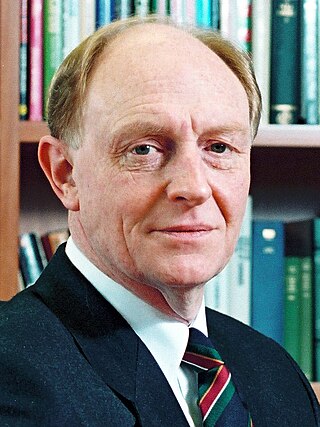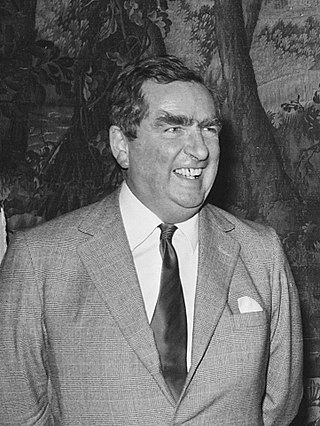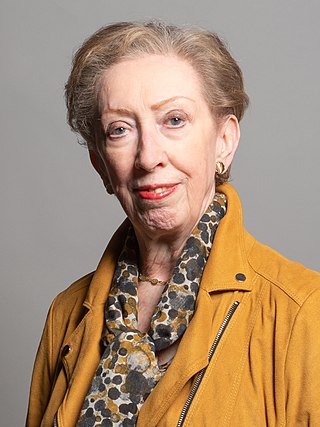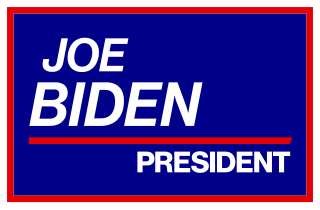Related Research Articles

Neil Gordon Kinnock, Baron Kinnock, is a Welsh politician who was Leader of the Opposition and Leader of the Labour Party from 1983 to 1992. He was a Member of Parliament (MP) from 1970 to 1995, first for Bedwellty and then for Islwyn. He was Vice-President of the European Commission from 1999 to 2004. Kinnock was considered to be on the soft left of the Labour Party.

Anthony Neil Wedgwood Benn, known between 1960 and 1963 as The Viscount Stansgate, was a British Labour Party politician and political activist who served as a Cabinet minister in the 1960s and 1970s. He was the Member of Parliament for Bristol South East and Chesterfield for 47 of the 51 years between 1950 and 2001. He later served as President of the Stop the War Coalition from 2001 to 2014.

Roy Sydney George Hattersley, Baron Hattersley, is a British politician, author and journalist from Sheffield. A member of the Labour Party, he was MP for Birmingham Sparkbrook for over 32 years from 1964 to 1997, and served as Deputy Leader of the Labour Party from 1983 to 1992.

Denis Winston Healey, Baron Healey was a British Labour Party politician who served as Chancellor of the Exchequer from 1974 to 1979 and as Secretary of State for Defence from 1964 to 1970; he remains the longest-serving Defence Secretary to date. He was a Member of Parliament from 1952 to 1992, and was Deputy Leader of the Labour Party from 1980 to 1983. To the public at large, Healey became well known for his bushy eyebrows, his avuncular manner and his creative turns of phrase.

The 1987 United Kingdom general election was held on Thursday 11 June 1987, to elect 650 members to the House of Commons. The election was the third consecutive general election victory for the Conservative Party, who won a majority of 102 seats and second landslide under the leadership of Margaret Thatcher, who became the first Prime Minister since the Earl of Liverpool in 1820 to lead a party into three successive electoral victories.

Margaret Mary Beckett, Baroness Beckett,, is a British politician. She was a Member of Parliament for more than 45 years, from 1974 to 1979 and 1983 to 2024. A member of the Labour Party, she was the United Kingdom's first female Foreign Secretary, and served as a minister under Prime Ministers Harold Wilson, James Callaghan, Tony Blair and Gordon Brown. Beckett was Deputy Leader of the Opposition and Deputy Leader of the Labour Party from 1992 to 1994, and briefly Leader of the Opposition and acting Leader of the Labour Party following John Smith's death in 1994. A member of the Labour Party, she served as Member of Parliament (MP) for Lincoln from 1974 to 1979, and for Derby South from 1983 to 2024. Her 45 years in the House of Commons makes her the female MP in the Commons with the longest service overall and she was the last sitting MP who served in the Labour governments of the 1970s. Beckett alongside former Labour Party colleague Baroness Harman became members of the House of Lords in 2024.
The National Executive Committee (NEC) is the governing body of the UK Labour Party, setting the overall strategic direction of the party and policy development. Its composition has changed over the years, and includes representatives of affiliated trade unions, the Parliamentary Labour Party, constituency Labour parties (CLP), and socialist societies, as well as ex officio members such as the party Leader and Deputy Leader and several of their appointees.
The Socialist Campaign Group, also simply known as the Campaign Group, is a UK parliamentary caucus of the Labour Party including Members of Parliament in the House of Commons. The group also includes some MPs who formerly represented Labour in Parliament but have had the whip withdrawn or been expelled from the party.

Tribune is a democratic socialist political magazine founded in 1937 and published in London, initially as a newspaper, then converting to a magazine in 2001. While it is independent, it has usually supported the Labour Party from the left. Previous editors at the magazine have included Aneurin Bevan, the minister of health who spearheaded the establishment of the National Health Service, former Labour leader Michael Foot, and writer George Orwell, who served as literary editor.
The soft left, also known as the open left, inside left and historically as the Tribunite left, is a faction within the British Labour Party. The term "soft left" was coined to distinguish the mainstream left, represented by former leader Michael Foot, from the hard left, represented by Tony Benn. People belonging to the soft left may be called soft leftists or Tribunites.

The loony left is a pejorative term used to describe those considered to be politically hard left. First recorded as used in 1977, the term was widely used in the United Kingdom in the campaign for the 1987 general election and subsequently both by the Conservative Party and by British newspapers that supported the party, as well as by more moderate factions within the Labour movement to refer to the activities of more militantly left-wing politicians that they believed moderate voters would perceive as extreme or unreasonable.
The Labour Co-ordinating Committee (LCC) was a faction in the British Labour Party, established in 1978 and wound-up in 1998. It moved from a group established to challenge the leadership of the party from the left to the vanguard of Tony Blair's drive to modernise the party's organisation and policies.

Eric Samuel Heffer was a British socialist politician. He was Labour Member of Parliament for Liverpool Walton from 1964 until his death. Due to his experience as a professional joiner, he made a speciality of the construction industry and its employment practices, but was also concerned with trade union issues in general. He changed his view on the European Common Market from being an outspoken supporter to an outspoken opponent, and served a brief period in government in the mid-1970s. His later career was dominated by his contribution to debates within the Labour Party and he defended the Liverpool City Council.
The Mid Staffordshire constituency of the United Kingdom Parliament held a by-election on 22 March 1990. The result was the election of Labour candidate Sylvia Heal to succeed the previous Conservative Member of Parliament John Heddle, who had precipitated the by-election by committing suicide.
The 1988 Labour Party leadership election saw Tony Benn, identified with the left wing of the British Labour Party, challenge the incumbent leader Neil Kinnock identified with the more moderate social democratic wing.
New Times was an intellectual movement among leftists in Great Britain in the late 1980s. It was centred on the Eurocommunist faction of the Communist Party of Great Britain (CPGB), and most of the intellectual groundwork for the movement was laid out in the latter party's official theoretical journal, Marxism Today.

The 1988 presidential campaign of Joe Biden, a Democratic U.S. Senator from Delaware, began in June 1987. Originally, Biden was regarded as potentially one of the strongest candidates in the field. In September 1987, however, reports emerged that he had plagiarized a speech by the British Leader of the Opposition and Labour Party Leader, Neil Kinnock. Other allegations of past law school plagiarism and exaggerating his academic record soon followed and Biden withdrew from the race later that month.
The Militant tendency, or Militant, was a Trotskyist group in the British Labour Party, organised around the Militant newspaper, which launched in 1964.
The Policy Review was a wide-ranging study by the British Labour Party. It was appointed to formulate popular policies in the aftermath of Labour's third successive electoral defeat in 1987.
Elections to the Labour Party's Shadow Cabinet occurred in November 1988. In addition to the 15 members elected, the Leader, Deputy Leader, Labour Chief Whip, Labour Leader in the House of Lords, and Chairman of the Parliamentary Labour Party were automatically members.
References
- Richard Ford and Philip Webster, ‘Benn attacks 'apologetic' attitude of Labour’, The Times (12 January 1988), p. 2.
- Richard Ford, ‘Labour starts new campaign to win South’, The Times (31 May 1988), p. 5.
- Robin Oakley, ‘Thatcher is accused of losing her nerve’, The Times (3 May 1988), p. 2.
- Robin Oakley, ‘Kinnock's next challenge’, The Times (4 October 1988), p. 16.
- Andrew Pierce, ‘Hague on video to break with the past’, The Times (23 December 1997), p. 2.
- Tom Sawyer, ‘Restoring Labour's X appeal’, The Times (14 September 1987), p. 12.
- Eric Shaw, ‘Towards Renewal? The British Labour Party's Policy Review’, in Richard Gillespie and William E. Paterson (eds.), Rethinking Social Democracy in Western Europe (London: Routledge, 1993), pp. 112–132.
- Philip Webster, ‘Labour sets up camp in enemy Sussex’, The Times (3 December 1987), p. 4.
- Nicholas Wood, ‘Labour travels to Brighton to talk a lot and listen a little’, The Times (26 January 1988), p. 2.
